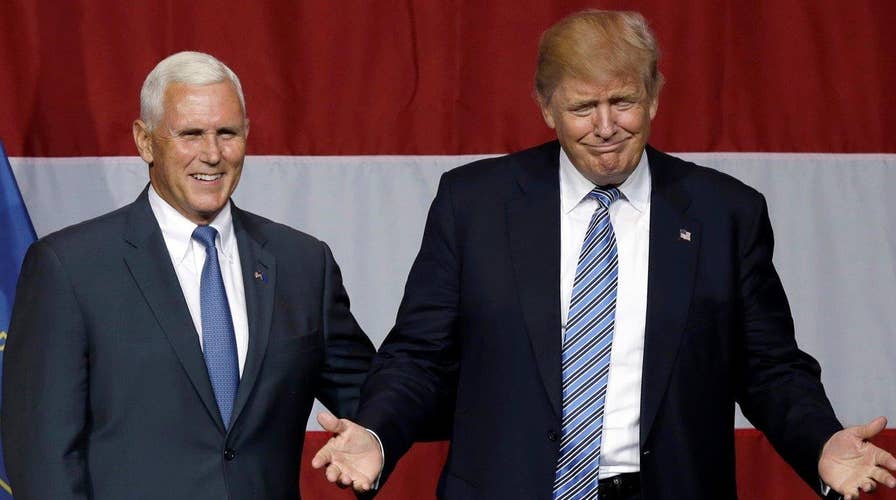With a tweet on Friday morning, the GOP’s vice presidential speculation comes to an end as Indiana Governor Mike Pence joins the Trump ticket. But does the VP candidate -- historically and in this election year-- really make a significant difference when it comes to the general election?
Let’s take a look at both sides of the argument. We'll start with the "nos."
No – the VP candidate doesn’t make a big difference
1. Most voters don’t know anything about the potential VP candidates
If you’re a political junkie or Beltway insider, you may be surprised at the relative anonymity of many VP candidates. For example, in a recent Economist/YouGov poll, 64 percent of respondents said they did not know if they had a favorable or unfavorable opinion of Mike Pence. Other leading VP candidates on the Democratic side such as Cory Booker (55 percent) and Tim Kaine (66 percent) were similarly unknown by the voting public.
2. Voters say they vote for the top of the ticket, not the VP
Even when voters prefer the other party’s VP candidate – which historically happens roughly 10 percent of the time – it’s the preference for the presidential candidate that “dominates the decision-making process.” In terms of actually getting voters to cross party lines, the net impact of a VP is less than 1 percent, according to a detailed study of VP selection. That said, for voters who are undecided about the presidential candidates, the VP pick may have a larger impact.
Political scientists Christopher Devine and Kyle Kopko have conducted one of the most extensive studies of the long history of VP selections, and their research suggests in fact the VP rarely matters relative to how the ticket would have done otherwise.
3. Indiana has 11 Electoral College votes
Political scientists have extensively tried to measure what is called the “home state” effect. The idea is that the selection of the VP at a minimum will help lock up the Electoral College votes for that candidate’s home state.
Political scientists Christopher Devine and Kyle Kopko have conducted one of the most extensive studies of the long history of VP selections, and their research suggests in fact the VP rarely matters relative to how the ticket would have done otherwise. Even if it did make a difference, Indiana has just 11 electoral votes, and has voted for the Republican ticket 9 out of the past 10 presidential elections.
Yes – the VP selection matters a lot
1. This election is unlike anything we’ve seen in the past.
In order for past history to tell us something, it has to apply to the election at hand. This has been an unusual election on many dimensions—a political outsider and businessman as the presumptive Republican nominee, and the first woman and a former first lady as the presumptive Democratic nominee. And, recent history might suggest that VP choices are becoming more important. If you look at the state numbers for Alaska in ‘08, Delaware in ‘08 and ‘12, and Wisconsin in ‘12 (despite still losing in the state), we see an uptick in the importance of the VP ticket relative to performance by the party in prior elections. To the extent recent polling suggests 10-percent of Tea Party supporters still uncertain about Trump, the choice of Mike Pence—with a 100 percent rating from the American Conservative Union—may help with that key voting bloc.
2. Campaigns – and the media – act as if the VP matters
What if there is no direct VP effect, but campaigns and the media behave as if there is?
It was well documented in the news media that campaigns make strategic decisions based on VP picks. One recent example-- in the 2008 election, it was widely reported that than candidate Obama was trying to put Alaska into play, and in fact, his campaign spent $134,000 in the state.
After John McCain announced Governor Sarah Palin as his running mate, however, the media at the time proclaimed “it crushed Obama’s hopes of winning the Frontier State” leading to withdrawals of campaign staff and cuts in advertising.
In the past week alone, you can find thousands of articles in the media about the candidates’ potential VP picks. Clearly it’s a decision that journalists are paying attention to.
3. The VP is still just a heartbeat – or a change of heart – away from the presidency
If Donald Trump is truly “more interested in winning the presidency than serving as president,” as some have noted, we may see an unprecedented scenario in which Mike Pence ends up in the Oval Office. Even if Trump or Clinton fully intend to serve out their term(s), however, remember that the vice president has become president 14 times throughout history – eight times through the death of a sitting president, once through resignation of the president, and five times by being elected president after serving as vice president. It’s happened before, and it could happen again.









































